Iran's Parliament Asks Executive, Judiciary To Restrict Internet Access
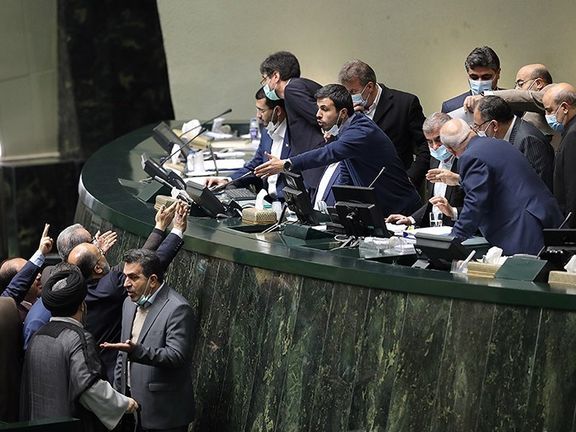
180 members of the Iranian parliament have issued a statement asking the government and judiciary for measures to restrict peoples’ activities on the internet.

180 members of the Iranian parliament have issued a statement asking the government and judiciary for measures to restrict peoples’ activities on the internet.
The statement, which was read out in the parliament on Wednesday, described the cyberspace in Iran as unbridled and urged the two other branches of the Islamic Republic not to wait for legislation to put limits on internet in the country.
The lawmakers said the cyber-sphere has provided the opportunity for a “relentless barrage of insults, lies, and slanders against the sanctities, beliefs, culture and social stability” of the country.
Parliament has been toying with a bill to limit the internet, titled “Legislation to Protect Cyberspace Users’ Rights,”but so far the conservative majority has failed to approve it.
The approval of the bill would systematically put broad restrictions on social messaging platforms and boost internet filtering in Iran.
According to IRNA, the parliament had a closed-door session Wednesday morning with officials of the intelligence ministry to examine security challenges of the cyberspace.
Iran has restricted access to the internet for two decades and popular social media platforms such as Facebook and You Tube for the past ten years. An overwhelming majority of Iranians routinely use circumvention software to go around government blockages.
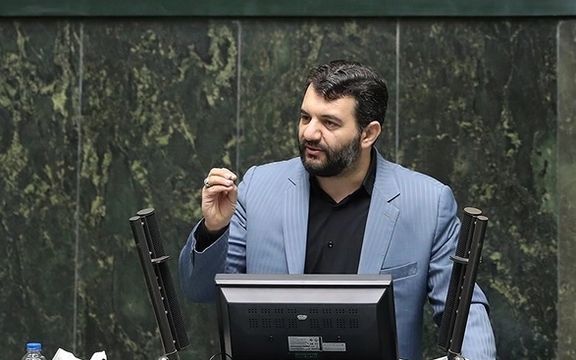
A hardliner Iranian lawmaker has accused the labor minister of treating his ministry's resources as spoils of war and giving top jobs to his friends.
Naser Mousavi Largani said Labor Minister Hojat Abdolmaleki, a former state television showman, approaches his work as if it is a television game. He further accused the minister of employing individuals whose credentials have been rejected by the intelligence organizations.
According to Rouydad24 website, Largani said that as Abdolmaleki knew he could not officially employ those individuals, he appointed them as caretakers of various departments of the labor ministry.
The website wrote that "Surprisingly, instead of supporting their colleague, other lawmakers at tried to persuade Largani to drop the issue against the labor minister.
Meanwhile another scandal broke out on Tuesday as Iranians on social media slammed the appointment of former state TV chief Abdolali Aliasgari as the head of Iran's most important petrochemical plant that reportedly provides some 20 percent of Iran's much needed hard currency. Critics said he is neither an expert in industrial management nor in the petrochemical industry. Others argued: "Who else in Iran is in charge of anything based on education or expertise?"
Regarding the labor minister, activists on social media had disclosed a letter he wrote to the country's Administrative and Employment Office asking it to disregard the standards about employment and approve the hiring of 12 of his friends who would occupy top posts at the ministry. Meanwhile, the IRGC Intelligence Organization reportedly arrested one of those hired by Abdolmaleki on charges of financial corruption, but the minister intervened and promised to fire the man.
In August, when 191 lawmakers endorsed Abdolmaleki's credentials as minister, a few lawmakers, including Largani, warned that those who voted for the showman will regret their decision soon.Largani argued that "70 million people's livelihood depends on this ministry in one way or another as it is in charge of the national Pension Fund as well as being tasked with boosting employment in Iran." He added that the ministry owns several companies including the Isfahan Steel Mill and it cannot be run by a young man who lacks the necessary experience and expertise.
Other lawmakers including Hassan Lotfi, a member of the Social Affairs Committee of the Majles, have also criticized Abdolmaleki for nepotism and "giving big jobs to small people."
In Monday's session of parliament Largani said that not only Abdolmaleki has hired people who have no relevant skills or experience, he has also fired some of the experienced managers at the labor ministry. Meanwhile, Largani criticized Abdolmaleki for saying that as labor minister he is not responsible for creating jobs. "What you are doing is bad for the president's reputation," he said.
Largani said that the Minister was breaking the law and he, as a lawmaker, will oppose him with all that he has in his power.
Nepotism and giving big jobs to friends is also an issue in Tehran Municipality. According to ILNA, on Tuesday, Mehdi Eghrarian, a member of the Tehran City Council criticized Mayor Alireza Zakani for disorderly hirings. He particularly criticized the mayor for appointing individuals from his circle of friends and family as the head of the Municipality's Welfare, Social Services and Partnerships Organization. Eghrarian said that a series of employments have taken place at the Tehran Municipality that do not conform to rules and regulations.
"We cannot constantly talk about the importance of laws and violate the same laws at the same time," he added.
Again, in the same way that hardliner lawmakers stopped the debate about the labor minister, the Chairman of the Tehran City Council, Mehdi Chamran insisted that the discussion about illegal employments at the municipality should stop at once.
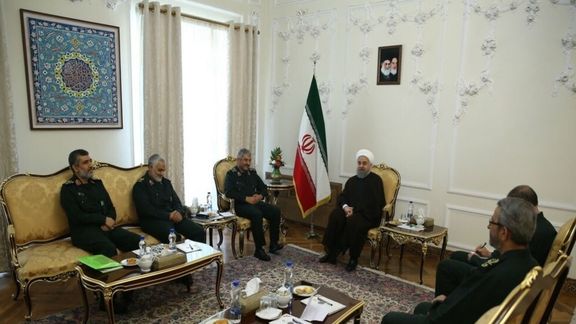
An IRGC commander has disclosed details of a "very frank and fierce meeting" with former President Hasan Rouhani in which commanders, including Ghasem Soleimani, issued a stark warning to him.
The interview with the IRGC Aerospace commander Amir-Ali Hajizadeh was published by the hardline Kayhan newspaper Wednesday and was focused on Soleimani, the slain commander of the IRGC Qods Force, who was killed in Baghdad by a US drone strike on January 3, 2020.
Hajizadeh told Kayhan that the meeting with the former president was held during his second term of presidency to warn him that the IRGC would not stay silent regarding his “transgressions.”
Hajizadeh was probably referring to Rouhani's meeting including Commander-in-Chief Mohammad-Ali Jafari and Soleimani on July 25, 2017, a few days before the confirmation of Rouhani’s re-election by Supreme Leader Ali Khamenei. Hajizadeh's account of the meeting is in stark contradiction to state media reports at the time which said Rouhani and the commanders had expressed support for each other without mention of any confrontation.
Summer of discontent
Tensions between Rouhani and the IRGC rose to new heights after his re-election on May 29, 2017. In a June 23 meeting with businessmen, Rouhani strongly criticized IRGC's business activities. "Part of the economy is controlled by an unarmed government, but we surrendered it to a government armed with guns," he said about IRGC's meddling in government affairs.
Rouhani was apparently referring to IRGC-affiliated business consortiums' taking over big companies such as the Iran Telecommunications Company in 2009 in the name of privatization during the presidency of Mahmoud Ahmadinejad. The Mobin Trust Consortium, largely owned by the IRGC Co-op Foundation, had won the tender for $7.8 billion along with two other state entities under irregular and suspicious circumstances.
In the interview with Kayhan, Hajizadeh did not make any mention of IRGC's economic activities and said the commanders offered to help Rouhani's government. "You saw in crises such as floods and earthquakes and other things the IRGC was really present," he said in the interview while accusing Rouhani of "assaulting friendly forces," meaning regime insiders.
"The Revolution, people, the ruling system, and the Leader are our redlines. Don't think you can always say these things and we will remain silent," Hajizadeh said the commanders in the meeting warned Rouhani while adding that Soleimani expressly warned Rouhani not to follow the same path as Ahmadinejad.
"Do you want to become like him? Why are you self-harming? Why are you constantly attacking us? Let's solve the problems," Soleimani told Rouhani according to Hajizadeh.
Do you want to become like Ahmadinejad?
Many allege that it was the IRGC that helped Ahmadinejad, a quite obscure figure, to climb the political ladder and capture presidency in 2005.
Relations between Ahmadinejad and the IRGC deteriorated during his second term, after he was once again helped by the Guards to overcome rivals in the disputed elections of 2009. But in 2011, Ahmadinejad publicly defied Supreme Leader Ali Khameneiover sacking his intelligence minister Heydar Moslehi. He also attacked the Guards publicly on several occasions and even dubbed them "our smuggler brothers" in reference to IRGC's massive role in hugely profitable illicit imports through ports under its direct control.
Apparently referring to Ahmadinejad and Rouhani's objection to IRGC's support of proxy forces in regional countries, Hajizadeh said under the influence of "poisonous propaganda" many questioned Soleimani's spending of Iranian money in other countries. "Why does he take our money abroad? Why, in their view, does he support a dictator? Why should we get involved in Syria anyway?" Hajizadeh said, presumably referring to Ahmadinejad and Rouhani.
In the interview, Hajizadeh also admitted that there was so much opposition to the IRGC's involvement in Iraq and Syria that the death of its forces in the early days of the conflicts had to be kept secret. "We really didn't know how to justify the deaths of the first martyrs of the wars in Iraq and Syria," he said adding that not being able to call them martyrs and burying them as such was a big problem and they had to be buried without any ceremonies.
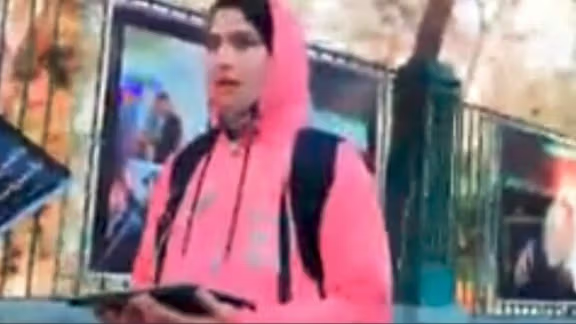
A student interviewed by Iran’s state-run TV on the downing of an airliner in 2020 says her words were doctored to support the official account of the incident.
The video report in which university student Shaghayegh Amiri appeared was shown by the state-run television (IRIB) on the anniversary of the downing of a Ukrainian airliner on January 8, 2020, by the Revolutionary Guards (IRGC). Speaking to local media Tuesday, she said the airing of the vox-pop has caused her great pain because what she appeared to be suggesting in the report was not what she had actually said.
The report consisted of a succession of fast-paced sentences chosen from interviews with young people in Tehran streets. The answers were arranged in a way as to suggest that they all agreed that the decision by the missile operator to shoot down the plane was logical.
The IRGC, which after three days of denial finally admitted that it had downed flight PS752 with two missiles, maintains that the operator of the air defense system mistook the plane for an enemy missile and made a hasty decision to shoot it down to save lives.
Many Iranians, including most of the victims' families, believe that the IRGC intentionally shot down the plane. Such suspicions are reinforced by the fact that the tragedy occurred only hours after the Guards fired more than a dozen missiles at bases hosting American troops in Iraq in retaliation for the US targeted killing of Qods Force Commander Ghasem Soleimani just days earlier.
The young student said many among her family and friends who are not aware of the circumstances in which the interview took place are upset with her that she made remarks contradicting her own beliefs.
In her own defense, Amiri claimed that the interviewers used various tricks to manipulate her and her companion to say what they wanted to hear from them to suit their scripted scenario and heavily edited the footage they had taken to remove what did not fit the script.
According to Amiri, the IRIB reporters approached her as she was waiting for a friend on the street and told her they wanted to ask some questions for a program on the occasion of the second anniversary of the tragedy that killed all 176 onboard the commercial flight.
"They gave me a tablet and asked me to play a video. In it you saw a red spot on a radar screen which indicated danger and you had to decide whether to shoot at it or not … 200 people would be killed if you shot at it and if you didn't, 5,000 lives would be lost. You had to decide [fast] which was more logical, the killing of 200 or the death of 5,000," Amiri said about the circumstances in which the interview took place. She accused the interviewers of insisting that she say she would fire at the plane if she were in a position to have to make a decision.
Amiri said that she challenged the interviewers and pointed out that the first missile shot at the Ukrainian plane may have been fired by mistake, but a second missile was also fired. "I asked them what justified the firing of the second missile. But none of this was included in the video shown on television," she said.

An Iranian lawmaker has sent a written warning to the sports minister, warning him against common manipulations in the elections of federation chairmen.
Abbas Moqtadaei, who is the deputy chair of the national security committee of the parliament, said on Tuesday that repeated delays in holding the election in the gymnastics federation have put it under the threat of suspension by international institutions.
He said that engineering the results of elections in sport federations has always been a problem in the country, and it is also reported under the current minister.
The elections in federations of boxing, shooting, basketball, taekwondo, skate, and some others have also caused controversy in recent months.
The mismanagement in Iran’s sport sector is not something new and has caused numerous problems for the sport community of the country, with many athletes leaving Iran to play for other countries.
Recently, the Asian Football Confederation (AFC) barred three top Iranian football clubs, including Persepolis and Esteghlal, from participating in the 2022 Asian Champions League tournament.
The AFC did not elaborate on the exact reasons behind the decision but said the clubs failed to meet the required licensing regulations that include issues such as timely submission of their documents or unpaid membership fees.
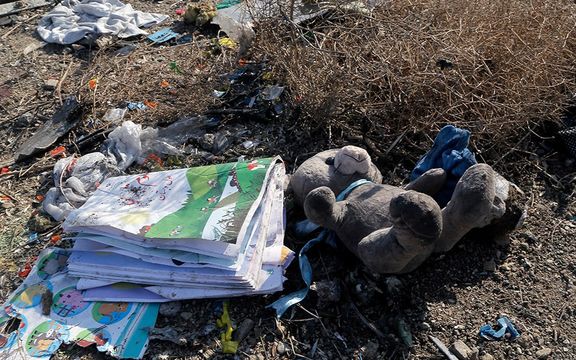
Iran’s hardline Kayhan daily has lashed out at news outlets for publishing an interview with the family of two victims who died in the downing of an airliner, saying they have a pro-US agenda.
During the interview, parents of two victims had said that the airliner was shot down deliberately to prevent possible US retaliation in the wake of Iran's missile attack on US bases in Iraq on January 8, 2020.
In an article titled "Revenge against the Revolutionary Guards on behalf of the United States”, Kayhan lodged an attack Tuesday against reformist outlets Ensaf News and Sharq newspaper, saying they want to create a poisonous atmosphere about the downing of the airliner.
The article said Mohsen Asadi-Lari, a former high-ranking health ministry official, and his wife Zahra Majd who lost both their children, misquoted remarks by Revolutionary Guard (IRGC) officials in their interview.
The bereaved parents, who broke their silence after two years, said IRGC officials had told themthat a war with the US could have happened if the plane was not shot down. "They say if the plane was not downed a difficult war would happen the next day. The US would have attacked, and ten million lives would be in danger."
Kayhan is known to be the mouthpiece for a lot of smear campaigns against the critics of the Islamic Republic and its Revolutionary Guards.